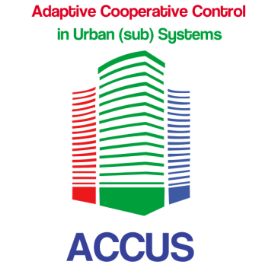ACCUS - Adaptive Cooperative Control in Urban (sub) Systems
Urban systems like traffic, energy, and outdoor lighting are managed by self-contained embedded systems – though the managed processes are deeply interconnected. New applications and collective optimization require integration of these systems, and this process represents a true “systems of systems” integration problem: these urban systems evolve independently and follow their own purpose and internal policies, which must not be affected by such integration and have their own management.
As a result, the integration has to manage emergent behavior and accept non-availability of components as the norm rather than the exception. This is particularly challenging when a control loop spans across several systems.
ACCUS aims to provide three innovations:
- An integration and coordination platform for urban systems to build applications across urban systems
- An adaptive and cooperative control architecture and corresponding algorithms for urban subsystems in order to optimize their combined performance
- General methodologies and tools to create real-time collaborative applications for systems of systems
ACCUS examines a set of `converged scenarios’ that span across urban systems to investigate requirements and utilizes semantic descriptions to define the reference architecture for the integration of urban systems.
The ACCUS system and tools will be validated and demonstrated on an extended use case in Poland.
The input of ACCUS is the work of several other ARTEMIS projects that focus on self-contained urban systems. ACCUS pursues ambitious goals. In order to achieve them, a well-established and high- quality consortium with a broad scope of complementary disciplines and long experience in European and National programs is ready to execute the task.
CEITEC participation
Community Energy Management
The most important purpose of CEMS (Community Energy Management System) is to balance energy supply and demand within the entire community. This is performed in order to decrease energy waste and make people more aware of the importance of energy management in their lives.
The increasing demand for energy in both advanced and emerging economies, the need for a reliable security of supply due to the ageing transmission and distribution equipment, and the installation of numerous distributed and renewable energy sources lead to the imperative demand to face the lack of coordination by adopting a unique management infrastructure reached by using information and telecommunications technologies, control technologies and security technologies.
CEMS promotes an efficient and reliable use of energy, facilitates balance between supply and demand, and levels the loads within the entire community via exchanging information with other systems. These systems comprise home EMSs, which manage power supply and demand in residential houses, and BEMSs or FEMSs, which play the same role in buildings and factories.
CEITEC participates in the development of building energy management systems and subsystems with respect to the integration of smart home appliances and home PVEs into smart grid systems.
Interoperability and ontology
Interoperability can be described as the capability of systems or units to provide and receive services and information between each other, and to use the services and information exchanged to operate effectively together in predictable ways without significant user intervention.
To achieve this definition, ontology is used as the main tool for semantic interoperability in ACCUS platform. Ontologies are needed for prevention and resolution of communication issues among heterogeneous systems, knowledge sharing, and information fusion. Ontologies facilitate information integration and interoperability among heterogeneous knowledge and information sources while maintaining high level of abstraction.
The main goal of CEITEC in this project part has several points:
- Presentation of existing technologies that are used to achieve interoperability through ontology
- Evaluation of tools and various interoperability architectures, and design of recommendations for ACCUS platform
- Presentation of different architectures that can create the basics of integration system for ACCUS project
Results of CEITEC team
Community Energy Management
In the field of community energy management, team members have met the following targets:
- Specification of functionalities, attributes, parameters, and control constraints of dwelling energy subsystems and multi-dwelling systems (2014).
- Design and implementation of a tool to simulate dynamic behavior of building energy management systems (2014).
- Implementation of ACCUS ICP plugins of models of systems and subsystems from the smart home domain; implementation of control strategies (expected 2015).
Interoperability and ontology
In the field of interoperability of heterogeneous systems, team members have met the following targets:
- Proposal of general architecture for an integration system that is based on ontology. (2014)
- Specification of software, tools for ontology formation, and recommendations for ACCUS platform. (2014)
- Cooperation with other partners to create ACCUS ontology. (expected 2015)
